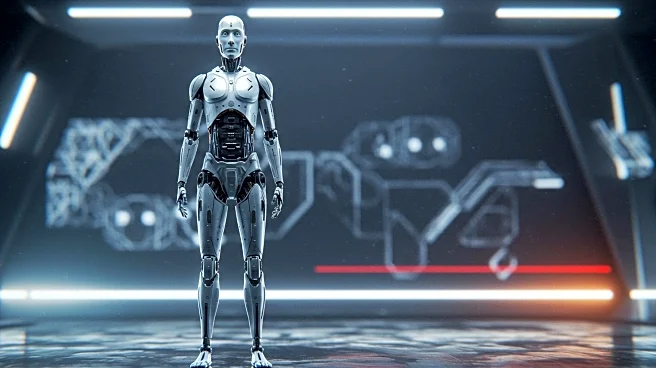What's Happening?
The inaugural World Humanoid Robot Games recently concluded, showcasing significant advancements in robotics. The event featured various competitions, including races and obstacle courses, where humanoid robots demonstrated their capabilities. Notably, Unitree, a robotics company, secured four gold medals in events such as the 1500m, 400m, 100m Obstacle, and 4x100m Relay. Another highlight was PNDbotics' Adam, the only full-size humanoid robot to complete the 100m Obstacle Race. The games also introduced Field Foundation Models (FFMs) by FieldAI, designed to enhance robot performance in dynamic and unstructured environments. These models aim to improve safety and reliability in scenarios where robots face uncertainty and physical constraints.
Why It's Important?
The World Humanoid Robot Games highlight the rapid advancements in robotics technology, which have significant implications for various industries. The development of humanoid robots capable of performing complex tasks suggests potential applications in sectors such as manufacturing, healthcare, and logistics. The introduction of Field Foundation Models represents a shift towards more adaptable and intelligent robotic systems, which could lead to safer and more efficient operations in unpredictable environments. These advancements may drive innovation and competitiveness in the robotics industry, potentially leading to economic growth and new job opportunities.
What's Next?
Following the success of the World Humanoid Robot Games, further developments in humanoid robotics are anticipated. Companies like Unitree and PNDbotics may continue to refine their technologies, aiming for broader applications beyond competitive events. The adoption of Field Foundation Models could expand, influencing the design and functionality of future robotic systems. As these technologies evolve, regulatory and ethical considerations will likely emerge, prompting discussions on the integration of advanced robotics into everyday life and industry.
Beyond the Headlines
The advancements showcased at the World Humanoid Robot Games may also raise ethical and societal questions regarding the role of robots in human environments. As robots become more capable, issues such as job displacement, privacy, and safety will need to be addressed. The development of humanoid robots that can navigate complex environments autonomously may lead to debates on the balance between technological progress and human oversight.









